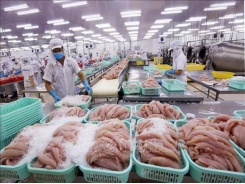Actively prevent and control aquatic diseases

In recent years, the area and output of aquaculture in Long An province has continuously increased, making an important contribution to the economic development in many localities. However, the abnormal changes in weather, epidemics, water pollution and so on are difficult issues that the provincial aquaculture industry is very concerned about.
Fish farmers need to actively prevent and control diseases (Illustrated photo)
For brackish water shrimp, currently, the total farming area in the whole province is 3,752.4 hectares (360 hectares of black tiger shrimp, 3,392.4 hectares of whiteleg shrimp), equaling 53 percent of the plan (7,080 hectares), equaling 102.4 percent compared to the same period. From the beginning of 2021 up to now, the total damaged area on shrimp is 224.52 hectares, equal to 6 percent of the farming area and equal to 61.2 percent over the same period last year (in which, early harvest loss is 181.4 hectares, accounted for 4.8 percent and lost 43.12 hectares, accounting for 1.2 percent of the farming area). According to the assessment of functional sectors, due to climate change, complicated weather, heavy rain and large difference in pond environment temperature, sudden changes cause shrimp to suffer from heat shock or water pollution, making the resistance of shrimp decrease, which is a favorable condition for pathogens to easily attack.
Tan Chanh commune is a locality with concentrated shrimp farming in Can Duoc district. In the past few days, when the weather began to change seasons, there was a large different temperature between day and night, the ponds of some households in the commune had a situation of shrimp suffering from heat shock, causing damage to shrimp-feeding farmers. The whole Tan Chanh commune has more than 940 hectares of water surface for aquaculture, the number of damaged shrimps from the beginning of 2021 to now is about 25 hectares, most of the damaged area is due to environmental factors.
Mr. Nguyen Van Cau, living in Dong Trung hamlet, Tan Chanh commune, said: “Due to the change of weather, the daytime temperature is high but the night time is low, along with that, the rain also greatly affects the water surface quality, the shrimp got heat shock and died. I plan to add a layer of net over the pond area to limit the sun-shining heat directly on the pond surface.
As for freshwater fish, in the districts of Dong Thap Muoi region of the province such as Thanh Hoa, Tan Hung, Vinh Hung, Moc Hoa, etc., the number of commercial fish raised in rafts, tanks, cages and ponds is very large. Therefore, the situation of disease, causing damage to farmers also often occurs.
Specifically, Vinh Hung district has a large number of fish rafts and cages, and in recent years, many diseases have appeared on aquaculture. According to the Head of the Agriculture and Rural Development Division (ARD) of Vinh Hung district - Huynh Van Lam, in the past, diseases such as sores, skin fungus, and red spots often occurred on farmed fish and caused damage to people. But over the past one year, these diseases have decreased significantly, the people’s fish farming also becomes more favorable.
Currently, in Vinh Hung district, there are 151 rafts and tanks feeding commercial fish, mainly snakehead fish, catfish, and so on with an average yield of 960 kilos per raft, with prices ranging from 25,000-35,000 VND per kilo, the average profit is from 15-20 million VND per raft or tank. In addition, the whole district also has 377.2 hectares of ponds for commercial freshwater prawn, catfish and snakehead fish.
Mr. Le Tan Sinh, living in Vinh Dai commune, Vinh Hung district, said: “I currently raise 0.3 hectares of catfish. Recently, fish diseases have appeared such as sores and skin fungus but caused little damage. Besides, fish died scatteredly due to environmental shock. About 10 days from now, I will harvest, with the current price of 30,000 VND per kilo, I will have a profit of 30-40 million VND.
Over the years, the Provincial Department of Animal Husbandry, Veterinary Medicine and aquaculture has always actively developed plans to prevent and control diseases on aquaculture; directed subordinate units to advise People's Committees of districts, town and city to direct specialized agencies and People's Committees of communes, wards and townlets to strengthen information and propaganda work on the mass media so that people are aware of the harmful effects of aquaculture epidemic and take proactive measures to prevent and control the disease. At the same time, it mobilizes and propagates aquaculture farming households in the area to proactively report when there are many aquaculture deaths, not to dispose of aquaculture bodies and discharge water from untreated diseased ponds into the environment; renovated and managed ponds, disinfected tools before and after use; used veterinary drugs and biological products to treat and improve the pond environment according to the instructions of veterinary authorities.
Deputy Director of the Provincial Department of livestock production, veterinary medicine and aquaculture - Nguyen Thanh Toan recommended: "Farmers need to regularly monitor the disease situation and promptly report to local authorities when an epidemic occurs. In addition, households need to learn fish farming techniques in books, newspapers or through the internet, to be more proactive in disease prevention and control for aquaculture, from selecting baby fish or shrimps to caring and harvesting them.
Có thể bạn quan tâm
Phần mềm

Phối trộn thức ăn chăn nuôi

Pha dung dịch thủy canh

Định mức cho tôm ăn

Phối trộn phân bón NPK

Xác định tỷ lệ tôm sống

Chuyển đổi đơn vị phân bón

Xác định công suất sục khí

Chuyển đổi đơn vị tôm

Tính diện tích nhà kính

Tính thể tích ao hồ



 Shrimp export reached 1.31 billion USD in the…
Shrimp export reached 1.31 billion USD in the…  Vietnam’s aquatic export targets US$9 billion in 2021
Vietnam’s aquatic export targets US$9 billion in 2021